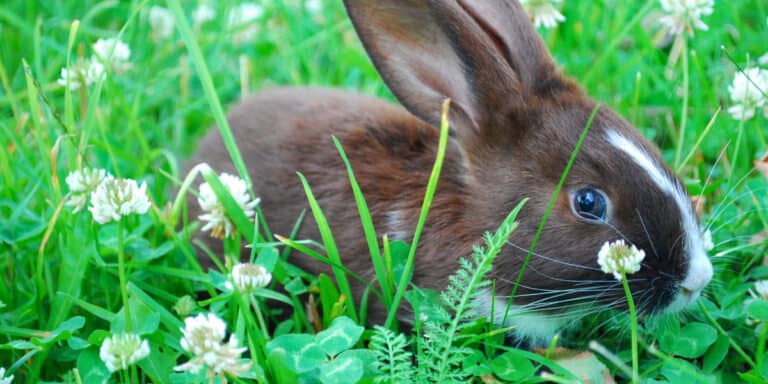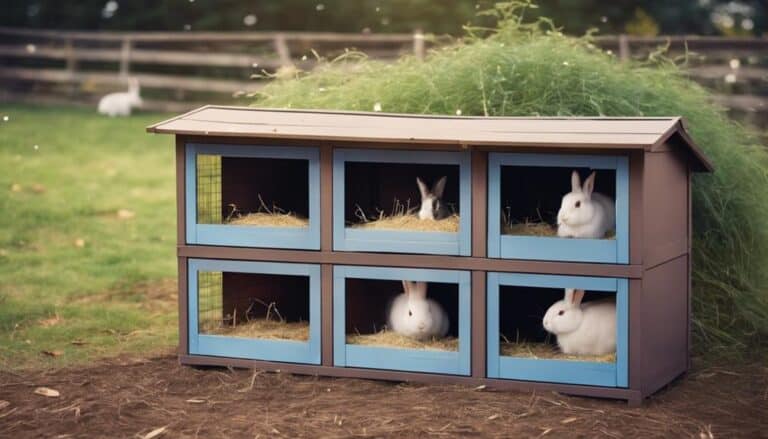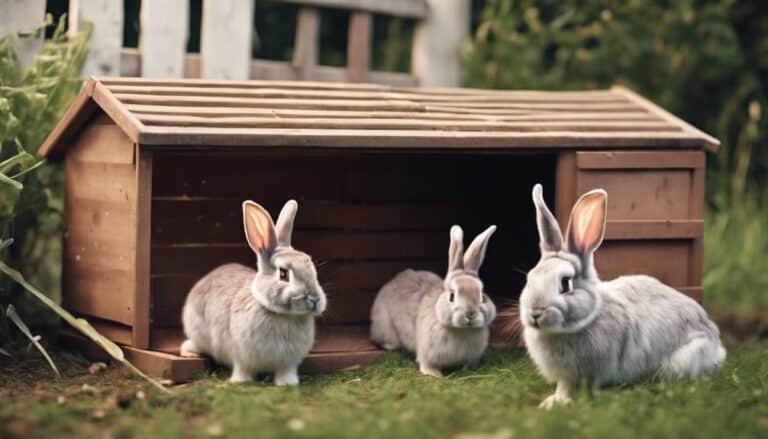Imagine a delicate balance as you navigate the care of a pregnant bunny. Their fragility during this time can be quite pronounced, requiring a gentle touch and keen awareness of their needs.
But why is it that pregnant bunnies seem more delicate than usual? The answer lies in their unique physiology and the demands pregnancy places on their bodies.
As you explore this topic further, you'll uncover essential insights into how to best support these vulnerable yet resilient creatures during this critical period.
Contents
Key Takeaways
- Pregnant bunnies require extra care and attention.
- Proper nutrition and a stress-free environment are crucial.
- Monitoring health, behavior, and nesting habits is essential.
- Ensuring a warm, safe space for the mother and litter is vital.
Rabbit Reproduction Basics
Female rabbits possess a remarkable ability to conceive at any time of the year, driven by their continuous breeding cycle. This unique trait makes them highly fertile, with the potential for frequent pregnancies and back-to-back litters. When a female rabbit becomes pregnant, she may exhibit nesting behavior, where she gathers materials to create a cozy nest for her impending litter. Additionally, pregnant rabbits may display territorial behaviors, becoming more protective of their space as they prepare for birth.
Proper care for a pregnant rabbit is important during this time. Ensuring she's a balanced diet, access to fresh water, and a comfortable, stress-free environment is essential for her health and the development of the kits. The gestation period for rabbits typically lasts about a month, after which an average litter size of 5 to 8 kits is born. It's also important to note that female rabbits can experience false pregnancies, showing signs of pregnancy without actually being pregnant. Understanding these reproductive basics is key to providing the best care for pregnant bunnies.
Identifying Pregnancy in Bunnies
Identifying pregnancy in bunnies presents a challenge due to their subtle signs and behaviors. One key indicator of imminent birth is nest-building behavior in bunnies. This behavior signals that the pregnant bunny is preparing for the arrival of her litter.
To essential the welfare of pregnant bunnies, it's vital to separate male and female rabbits post-birth. This helps prevent further pregnancies and allows the mother bunny to focus on caring for her current litter without the stress of additional breeding.
Additionally, maintaining visual and scent contact between rabbits is vital for their social interaction and overall well-being. By being attentive to these behaviors and needs, you can provide the best care for pregnant bunnies and contribute to a safe and comfortable environment for both the mother and her upcoming litter.
Essential Care for Pregnant Bunnies
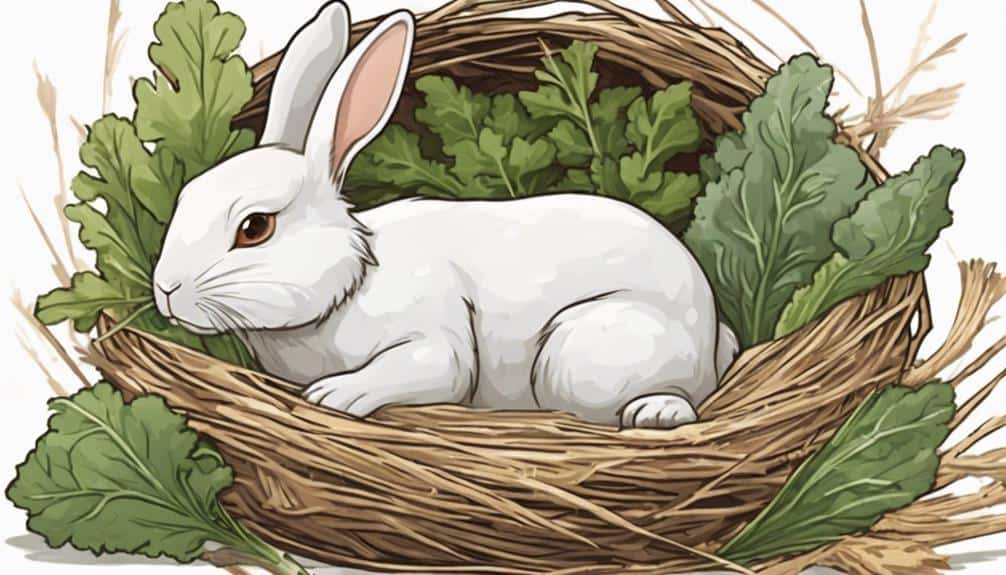
When caring for pregnant bunnies, ensuring they receive proper nutrition and a stress-free environment is essential to support their well-being during this delicate stage of pregnancy. Pregnant bunnies require extra care, including a diet rich in fresh hay, vegetables, and a small amount of pellets to meet their changing nutritional needs.
Providing a suitable nesting area is crucial, as pregnant bunnies are sensitive to disturbances which can lead to complications. Offering suitable nesting materials like hay and a comfortable nesting box will allow the bunny to create a safe space for her upcoming litter.
Regularly monitoring the pregnant bunny's health and behavior is important to detect any issues early. Due to their temperature sensitivity during pregnancy, maintaining a stable and warm environment is necessary to ensure the well-being of both the mother and her babies.
Handling Newborn Bunny Care
For effective care of newborn bunnies, closely monitor the mother's feeding and grooming of the newborn kittens. Baby rabbits, also known as newborn bunnies, are dependent on their mother rabbit for essential care in the initial stages of life. It's important to guarantee that the mother rabbit is providing adequate milk for the newborn babies to thrive. Young rabbit mothers may require extra attention and support to guarantee the well-being of the newborn kittens.
Regularly observe the newborn bunnies to prevent any signs of abandonment or neglect from the mother. Maintaining a warm and safe environment for the newborn bunnies is crucial to promote their health and growth. By attentively overseeing the feeding and grooming of the baby rabbits, you can contribute to their overall well-being and development. Remember, proper rabbit care during this critical period is important for the health and vitality of the newborn bunnies.
Ensuring Proper Feeding of Baby Bunnies
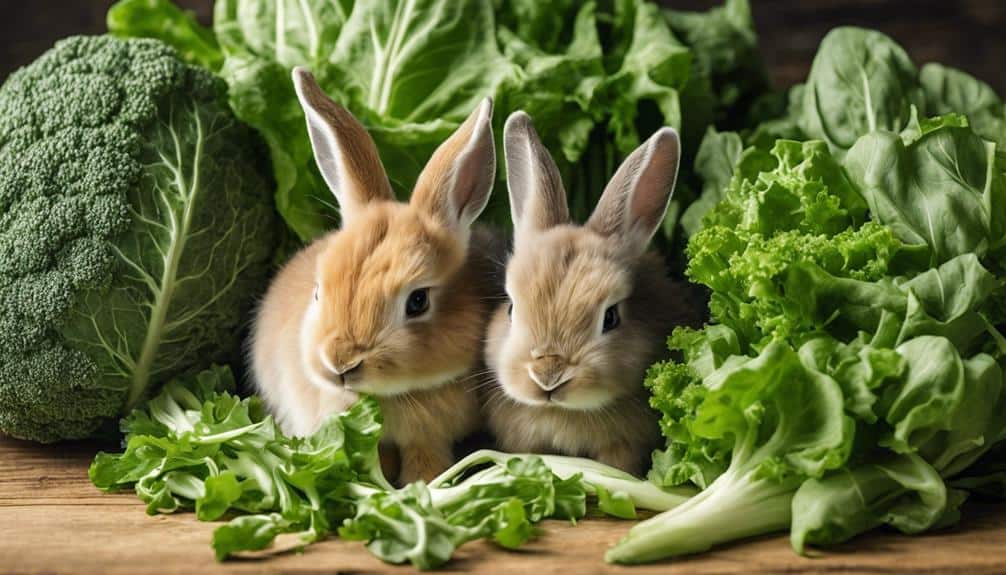
To guarantee the well-being of baby bunnies, closely monitoring their nursing behavior and milk intake from the mother rabbit is paramount. Baby bunnies rely solely on their mother's rabbit milk for proper nutrition in the initial weeks of life. Ensuring they're nursing well and receiving sufficient milk is essential for their growth and development.
Inadequate feeding can result in health issues and even mortality in baby bunnies. Monitoring the mother's behavior, such as her attentiveness to the babies, and the baby bunnies' weight gain can provide insights into successful feeding. If there are any concerns regarding feeding, it's advisable to consult a veterinarian experienced with rabbits for proper guidance and support.
Veterinarians can offer essential advice on optimizing feeding schedules and quantities, as well as addressing any potential problems that may arise. Proper feeding practices are crucial for the health and well-being of baby bunnies, ensuring they have the best start in life.
Dealing With Abandoned Bunny Babies
When dealing with abandoned bunny babies, rescuing them promptly is essential to their survival.
Providing proper nutrition through regular feedings of a suitable milk replacement every 2-3 hours is vital for their growth.
Ensuring warmth and safety by using a heating pad or hot water bottle wrapped in a towel helps protect the fragile babies from hypothermia.
Rescuing Abandoned Bunny Babies
When rescuing abandoned bunny babies, immediate warmth is essential to prevent hypothermia and secure their survival. Here are some important steps to take into account:
- Feeding Formula: Use specialized formula like kitten milk replacer to nourish the abandoned bunny babies adequately.
- Stimulate Urination: Gently rub their lower belly with a warm, damp cloth to help them urinate and defecate.
- Safe Environment: Provide a warm, quiet, and safe space for the abandoned bunny babies to thrive.
- Expert Guidance: Seek advice from wildlife rehabilitators or veterinarians experienced in caring for abandoned bunny babies to guarantee proper care and feeding.
Providing Proper Nutrition
For abandoned bunny babies, ensuring proper nutrition through bottle feeding with kitten milk replacer every 2-3 hours is important for their health and development. Pregnant rabbits require specific care, and providing the right nutrients is essential for the survival of the abandoned babies. Seek guidance from a veterinarian or experienced rabbit breeder to make sure you're using the correct milk replacer and feeding technique.
Proper nutrition is crucial for their growth and overall well-being. Remember to keep the feeding equipment clean and sterile to prevent any infections. By following the advice of professionals and maintaining a warm environment, you're giving these vulnerable babies the best chance at a healthy life.
Ensuring Warmth and Safety
To guarantee the warmth and safety of forsaken bunny babies, immediate measures must be taken to prevent hypothermia. Follow these steps to make sure the abandoned babies' well-being:
- Use a heating pad or warm water bottle wrapped in a towel to mimic the mother's warmth.
- Place abandoned babies in a nest box with soft bedding to retain heat.
- Avoid direct contact between the heat source and baby bunnies to prevent burns.
- Seek veterinary advice if the mother doesn't return within a few hours to make sure proper care for the abandoned babies.
Importance of Spaying and Neutering
Spaying and neutering your rabbits is essential for preventing overpopulation and ensuring their well-being. By reducing the risk of uterine cancer in females and curbing aggressive behaviors in males, these procedures can greatly improve your rabbits' quality of life.
It's recommended to spay or neuter your rabbits around 4-6 months of age to reap these health benefits and contribute to controlling the rabbit population.
Preventing Overpopulation
When considering the prevention of overpopulation in rabbits, the importance of spaying and neutering can't be emphasized enough. Here are some vital facts to keep in mind:
- Spaying and neutering rabbits can prevent overpopulation and reduce the number of unwanted litters.
- Female rabbits are at risk of health issues like uterine cancer if not spayed.
- Neutering male rabbits can decrease aggression and territorial behavior.
- Spaying or neutering rabbits can improve their overall health and lifespan.
These procedures aren't only recommended by veterinarians to control rabbit populations but also play a significant role in ensuring the well-being of these animals. By spaying or neutering your rabbits, you contribute to the overall welfare of the rabbit community.
Health Benefits for Rabbits
Considering the prevention of overpopulation in rabbits, one can't underestimate the significant health benefits spaying and neutering provide, particularly in safeguarding against issues like uterine cancer and reproductive infections. Spaying female rabbits before sexual maturity can prevent the development of uterine cancer, a common health concern in unspayed females.
Neutering male rabbits not only reduces aggressive behavior but also helps prevent testicular cancer. Additionally, spaying and neutering can decrease the likelihood of behavior problems such as urine spraying and territorial aggression.
Frequently Asked Questions
How Fragile Are Baby Rabbits?
Handling newborns requires gentle care and caution. Bonding with babies is essential for their development. Monitoring growth milestones, meeting nutritional needs, socialization tips, and addressing health concerns are important for ensuring the well-being of baby rabbits.
What Does a Pregnant Rabbits Belly Feel Like?
During pregnancy, a rabbit's belly may feel firm with grape-sized lumps after 10-14 days. Increased warmth and blood flow are common. You may notice belly movement and feel kicks as the due date nears. A vet check is essential for monitoring weight gain, hormonal changes, and pregnancy cravings.
How Do You Know When a Rabbit Is About to Give Birth?
When a rabbit is about to give birth, you might notice nesting behavior, appetite changes, increased digging, restlessness, and decreased activity. Prepare a nesting box and observe these signs to help the pregnant bunny during labor.
Do Rabbits Act Different When Pregnant?
During pregnancy, rabbits may exhibit nesting behavior, dietary changes, hormonal fluctuations, weight gain, and need for veterinary care. Modify exercise routines. Handle them gently to avoid stress. Provide a calm environment for their well-being.
Conclusion
To sum up, pregnant bunnies require extra care and attention due to their fragility and sensitivity. By providing a safe environment, proper nutrition, and regular monitoring, you can guarantee the well-being of both the mother and her offspring.
Remember, just like delicate blooms in a garden, pregnant bunnies need gentle nurturing to thrive and bring forth new life. So, handle with care and watch as nature's miracle unfolds before your eyes.

